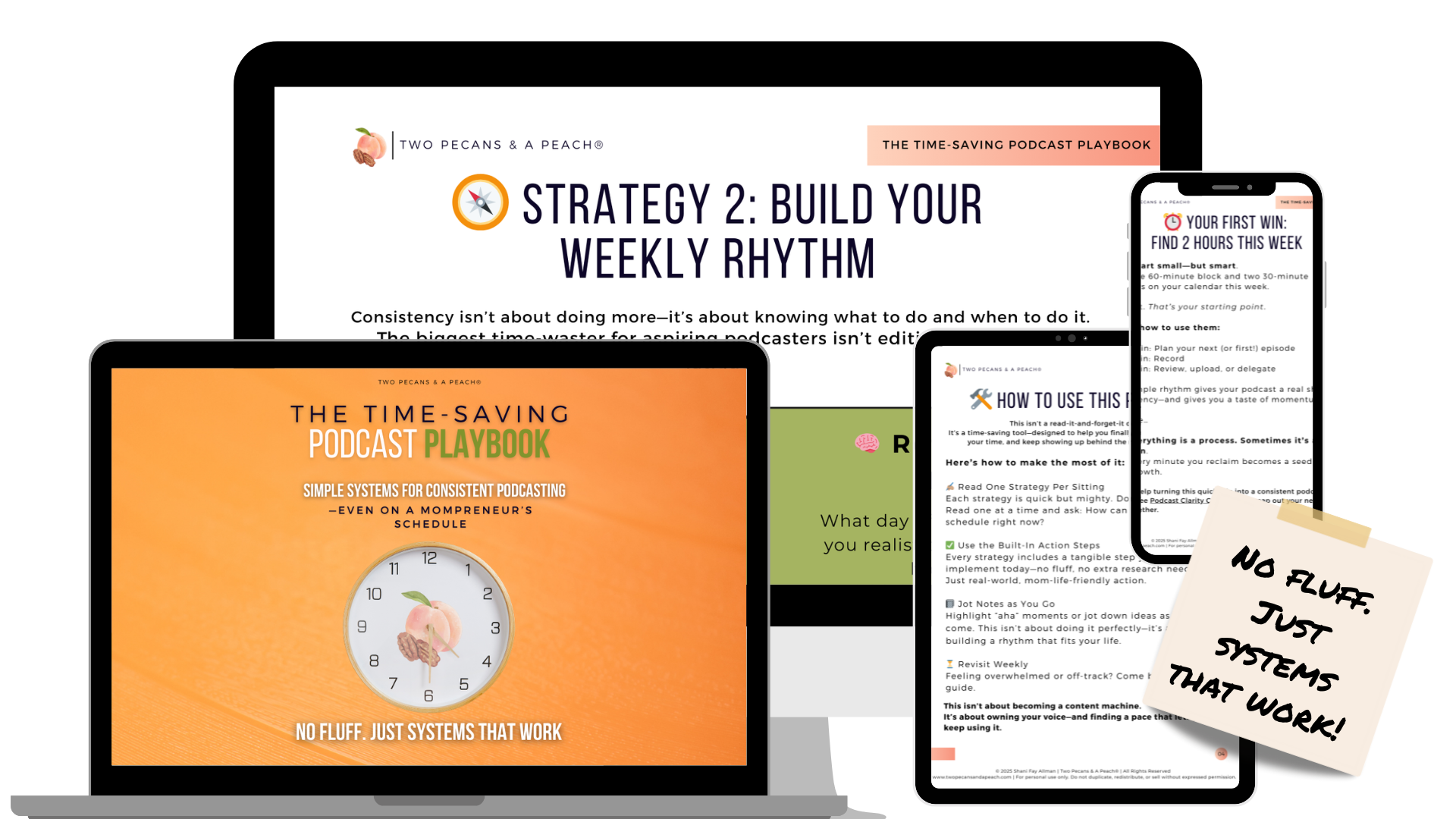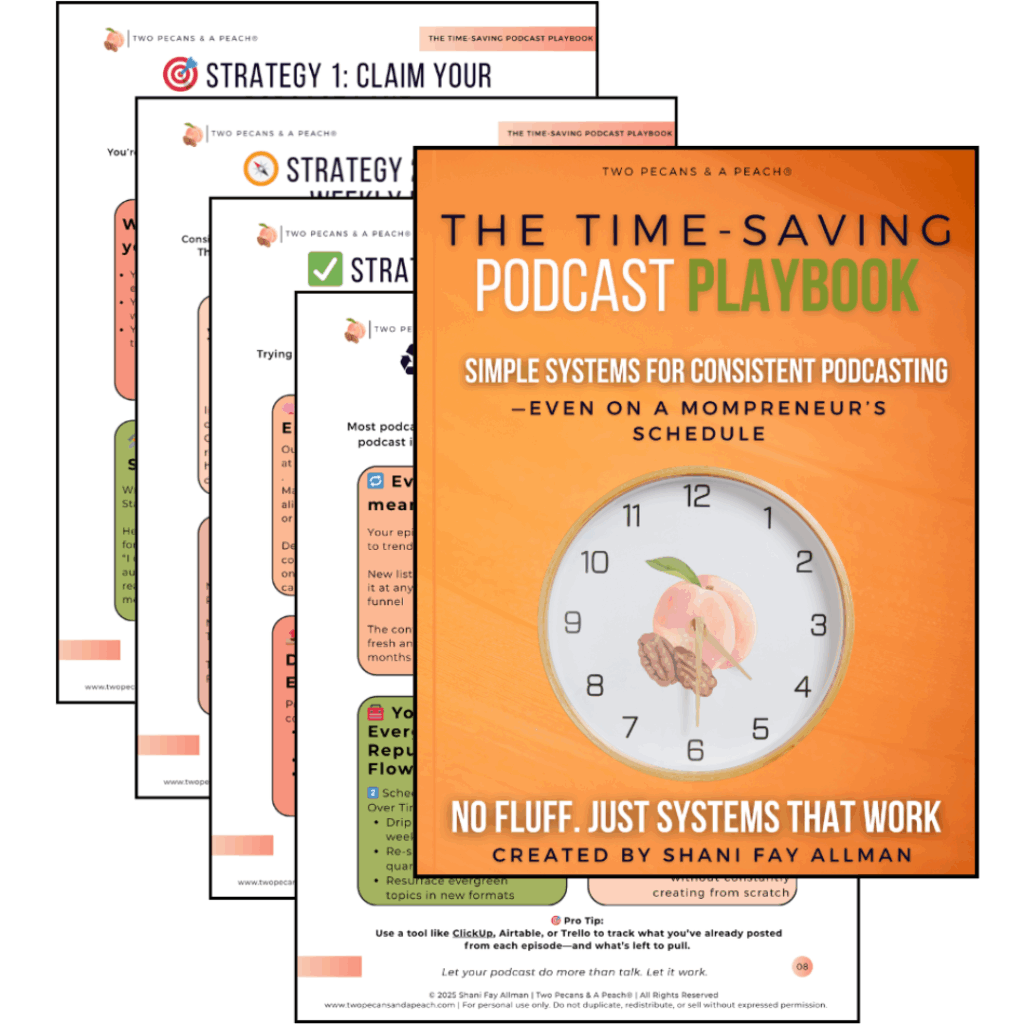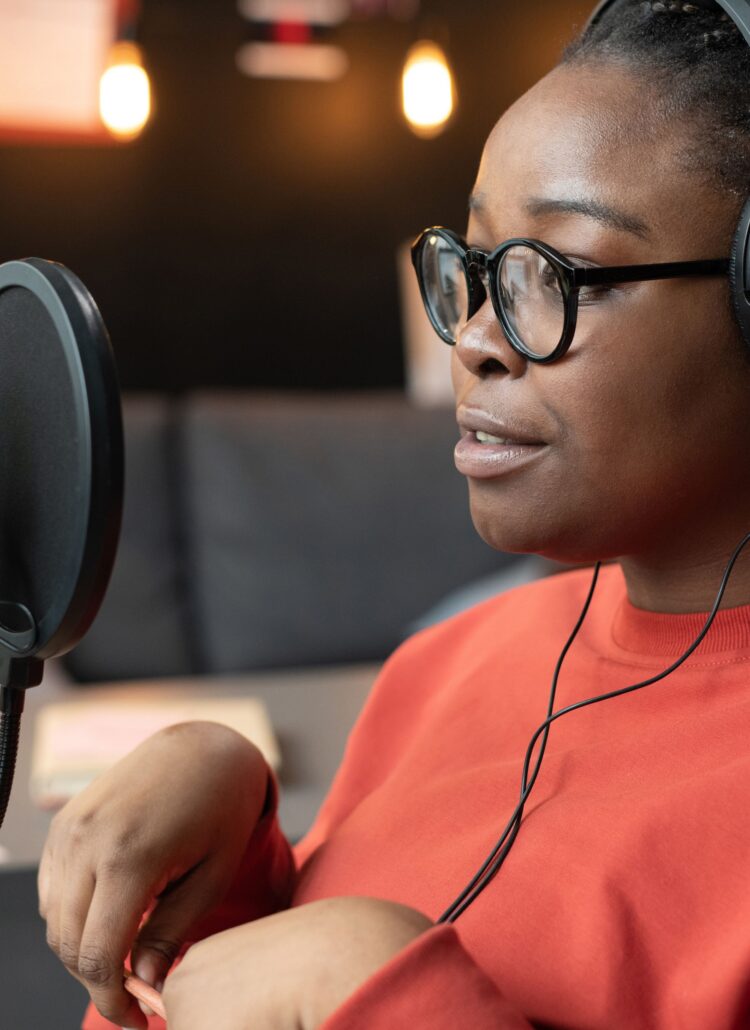🎙️ You’re Not the Problem—But Your Podcast Routine Might Be
If I had a dollar for every time someone told me, “I started a podcast… but I just couldn’t keep up,” I’d have a whole podcast studio named after that moment.
Truth is—starting a podcast is exciting. You’ve got a mic, a message, maybe even a Canva-made cover art, and a dream of impacting lives (or at least building visibility for your business).
But then life kicks in.
Client deadlines, school pickup lines, that one episode you still haven’t edited—it all piles up. Suddenly, your podcast is that unopened Google Doc you swear you’ll get back to… someday.
If this sounds familiar, you’re not alone. That’s exactly why podcasts fail after Episode 7—not because of lack of passion, but because of lack of rhythm.
Yup—seven. That’s the cliff where many brilliant voices hit burnout, perfectionism, or plain ol’ life interruption—and never come back.
But here’s the part nobody tells you:
You don’t fail because you’re inconsistent.
You fail because nobody gave you a realistic rhythm to follow in the first place.
That’s exactly why I created the Time-Saving Podcast Playbook—to help you shift from frazzled to focused with a system that actually fits your life.

The Real Reason You’re Struggling to Stay Consistent
Consistency isn’t about willpower—it’s about structure.
You’re not flakey. You’re not “bad at batching.” You’re a business owner, a team leader, maybe a parent—and your podcast is competing with a to-do list that includes everything from onboarding new clients to remembering spirit day at school.
So when podcasting starts to feel like just another thing to do?
It’s not because you lack commitment.
It’s because you never had a workflow that respected your reality.
I learned this the hard way. I used to sit down to record late at night, with my mic in one hand and a toddler monitor buzzing on the desk. Recording felt magical—editing? Not so much. It wasn’t long before I realized the problem wasn’t the podcast… it was the process.
And I wasn’t alone.
One of my clients said something that stuck with me:
“I thought launching would be the hard part… but now it feels like podcasting is taking up all my time.”
The truth? She was trying to create new content everywhere, while her podcast—the very thing meant to lighten her load—was being treated like just another task.
“Your podcast should do the heavy lifting.
One episode. Multiple pieces of content. Endless visibility.”
It’s seriously a no-brainer—if you’ve got the right system.

Here’s How to Shift From Chaos to Consistency in 3 Simple Steps
If you’re tired of podcasting feeling like a second full-time job, and you’re doing your best to beat the statistics on why podcasts fail after episode 7, try this quick framework I use with clients inside my Remote Podcast Production Program (RP3):
🧠 Step 1: Define Your Core Message
Don’t try to talk about everything. Get clear on the one message you want to be known for—and build your episodes around it.
Tip: If someone hired you tomorrow, what’s the #1 thing they’d want your help with? Start there.
📆 Step 2: Set a Realistic Rhythm
Weekly not working? Try biweekly. Consistency doesn’t mean constant. Choose a cadence you can actually commit to—and communicate it clearly.
Reminder: There’s no rule that says you have to publish weekly to be taken seriously.
🔁 Step 3: Repurpose with Intention
Each episode should live beyond the RSS feed. Turn your key points into reels, newsletters, or carousel posts. Your podcast is the seed—your content is the harvest.
Want a step-by-step version of this? That’s exactly what I created the Time-Saving Podcast Playbook for.
If you’re ready to beat the odds on why podcasts fail after episode 7, the Time-Saving Podcast Playbook will help you stay in the game with a rhythm that respects your real life.
🎯 Myth: “I can just do it myself…”
I had a client—let’s call her Tasha—who loved working with us.
We launched her show with a bang. She felt supported, consistent, and proud of what she was putting out into the world.
At one point she told me, “This is the most at ease I’ve ever felt creating content.”
But when it came time to renew her package, she hesitated.
She started doing the math in her head (as we all do) and decided “I’ve got the hang of it now. I’ll just do it myself.”
She brought on a $5/hr Virtual Assistant. Skipped the strategy. Cut out the support. And two episodes later… she quit.
Why?
Tasha could absolutely edit her own episodes. She could figure out the tech, create graphics, upload, repurpose, write captions—all of it
But just because you can… doesn’t mean you should.
It wasn’t that she couldn’t do the podcasting tasks—
It was that without a system, a strategy, and a support team keeping things moving… the wheels fell off.
She told me:
“It started to feel like everything in my business was about the podcast—but somehow, I was still behind. I thought launching would be the hardest part. I didn’t realize staying consistent without support would be the thing that broke me.”
Here’s what I know for sure:
Support isn’t just about saving time. It’s about staying consistent long enough to actually see results.
That’s exactly why I built RP3: Remote Podcast Production Program—
Not just to take work off your plate, but to give you the strategy, systems, and accountability to stay in the game.
Because doing it alone might save a little money up front…
But doing it right saves your podcast.
🎁 Ready to Shift from “Trying” to Consistent?
If you’ve ever felt like podcasting is pulling more from you than it’s pouring into your business—
Friend, it’s not your fault. You just need a rhythm that respects your real life.
🎧 The Time-Saving Podcast Playbook was built for exactly this.
It’s not fluff. It’s a focus tool—with strategic steps to help you show up, get ahead, and stay in your lane.
And if you’re already dreaming of passing off the tech, the editing, or even the planning…
You’re ready for more than a freebie.
🎯 Book a free Podcast Clarity Call and let’s map out what consistent, aligned visibility could actually look like for you.
Because your message deserves more than burnout.
It deserves momentum.











